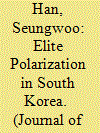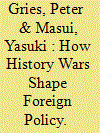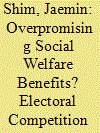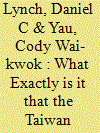| Srl | Item |
| 1 |
ID:
184757


|
|
|
|
|
| Summary/Abstract |
This study analyzes political polarization among the South Korean elite by examining 17 years’ worth of subcommittee meeting minutes from the South Korean National Assembly's standing committees. Its analysis applies various natural language processing techniques and the bidirectional encoder representations from the transformers model to measure and analyze polarization in the language used during these meetings. Its findings indicate that the degree of political polarization increased and decreased at various times over the study period but has risen sharply since the second half of 2016 and remained high throughout 2020. This result suggests that partisan political gaps between members of the South Korean National Assembly increase substantially.
|
|
|
|
|
|
|
|
|
|
|
|
|
|
|
|
| 2 |
ID:
184758


|
|
|
|
|
| Summary/Abstract |
This paper examines speechmaking on a contentious policy by arguably one of the most controversial figures to have assumed the Philippine presidency. Drawing on quantitative textual approaches on a corpus of 845 presidential speeches delivered between June 2016 and July 2020, we provide evidence that Rodrigo Duterte's evocative utterances against drug lords and criminals are not just deliberate illocutionary acts intended to court public support, but also priming tactics aimed towards a politically and economically significant audience whose acquiescence gives symbolic legitimacy to a controversial anti-crime policy. Using quantitative textual approaches and econometric analysis, we find that violent-crime rhetoric is more likely to accompany public pronouncements made before a political audience consisting of law enforcement authorities and government officials, as well as an economic audience made up of business chambers, overseas Filipino workers, and labor groups. Overall, the findings nuance an image of Duterte beyond that of a penal populist.
|
|
|
|
|
|
|
|
|
|
|
|
|
|
|
|
| 3 |
ID:
184755


|
|
|
|
|
| Summary/Abstract |
Do history wars shape international affairs? If so, how and for whom? Taking the historical dispute between China and South Korea over the ancient Gaogouli/Goguryeo Kingdom as a case study, this article explores the individual-level psychological micro-foundations of history wars. A 2020 survey experiment in South Korea pit “ours” vs “theirs” Goguryeo imitation Wikipedia entries to explore their downstream consequences. It revealed direct, indirect, and conditional effects. Exposure to China's claim to the Kingdom undermined Korean pride, increasing dislike of China, and lessening desires to cooperate with it. Pre-existing levels of nationalism divided South Koreans in how angry they became after exposure the Wikipedia primes. That anger, however, only shaped the China policy preferences of those South Koreans who viewed the balance of military power with China favorably. Implications for ownership disputes over kimchi and other national possessions are also discussed, as are the implications of history wars for war and peace in twenty-first-century East Asia.
|
|
|
|
|
|
|
|
|
|
|
|
|
|
|
|
| 4 |
ID:
184760


|
|
|
|
|
| Summary/Abstract |
In this article, I offer a theory of lawmaking in multiparty presidential systems with different legislative institutions. I present a model that combines Krehbiel's pivotal politics theory with Tsebelis's veto players theory. This model simplifies various institutional veto players into the de facto veto players. I analyze the model to explain how the government type (unified versus divided governments), the legislative rules (majoritarian versus supermajoritarian rules), and the party system (two-party versus multiparty systems) affect legislative productivity. I apply the theoretical results obtained to solve the puzzle about the nondifferential legislative performance between unified and divided governments in the National Assembly. I test a hypothesis stating that the distance between the ideological positions of the agenda-setter and the de facto veto players has a negative effect on the proportion of controversial bills enacted between the 16th and the early 21st National Assemblies.
|
|
|
|
|
|
|
|
|
|
|
|
|
|
|
|
| 5 |
ID:
184759


|
|
|
|
|
| Summary/Abstract |
Drawing insights from legislative, electoral and welfare studies, the article investigates whether and to what extent electoral competition affects incumbent politicians’ overpromising of social welfare benefits. For this, Taiwan is chosen as the case and the article examines the fate of elite-level social welfare legislative proposals in the period between 1992 and 2016. Findings drawn from quantitative bill sponsorship patterns demonstrate that political elites tend to propose failure-prone social welfare bills during election periods. Moreover, this tendency grew even more clearly in tandem with the rising levels of electoral democracy. The article argues that the overpromising of social welfare benefits is likely due to cognitive biases on the voter side allowing politicians to make promises without necessarily facing the negative consequences of under-delivery. The article contributes to the comparative welfare state literature by adding much-needed nuance to the existing debates on the relationship between democratic deepening, electoral competition, and the development of welfare politics.
|
|
|
|
|
|
|
|
|
|
|
|
|
|
|
|
| 6 |
ID:
184761


|
|
|
|
|
| Summary/Abstract |
North Korea is widely seen as having among the most corrupt governments in the world. However, the Kim family regime has not always been so accepting of government wrongdoing. Drawing on archival evidence, this study shows that Kim Il-sung saw corruption as a threat to economic development and launched campaigns to curb it throughout the 1950s. I find that these campaigns were at least somewhat successful, and they contributed to post-Korean War reconstruction and rapid development afterwards. So when and why did the regime shift from combating corruption to embracing it? I argue that changes in the country's economic system following the crisis of the 1990s, especially de facto marketization, made corruption more beneficial to the regime both as a source of revenue and as an escape valve for public discontent. This study's findings contribute to our understanding of the politics of corruption control in authoritarian regimes.
|
|
|
|
|
|
|
|
|
|
|
|
|
|
|
|
| 7 |
ID:
184756


|
|
|
|
|
| Summary/Abstract |
One source of the idea that Taiwan independence would be politically desirable is belief in the concept of “Taiwan subjectivity,” which indicates that Taiwan is not an appendage of China but instead an autonomous actor charting its own course – or trying to do so in the face of huge difficulties. The ruling (since 2016) Democratic Progressive Party (DPP) pledges fealty to the goal of ultimately realizing subjectivity but cannot aggressively pursue the agenda because of opposition from the People's Republic of China (PRC), the United States, and some in Taiwan itself. What might that agenda be? Using a Structural Topic Model, we excavate the subjectivity discourse as it developed from 2008 to 2020 in the mainstream DPP-supporting newspaper, the Liberty Times. We find fourteen topics associated with the concept, the most prevalent of which in recent years warn of threats to subjectivity's realization in the political and sociocultural spheres.
|
|
|
|
|
|
|
|
|
|
|
|
|
|
|
|